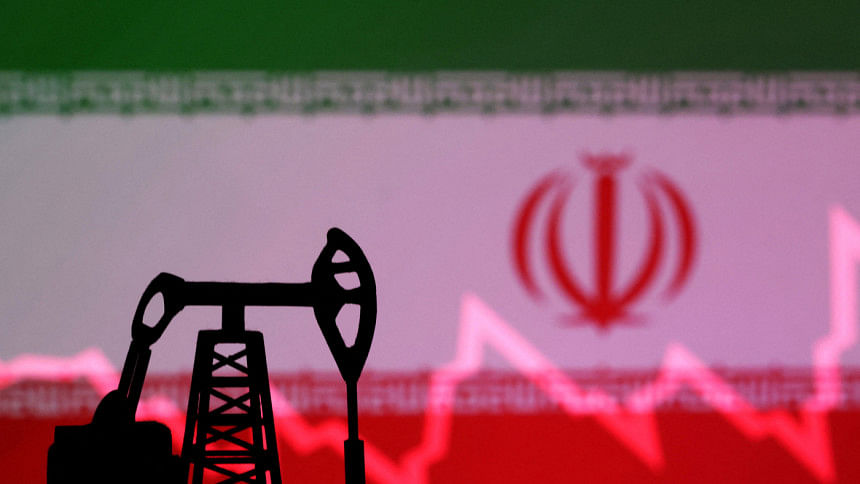From Strait of Hormuz to Dhaka: How a distant crisis could hit our homes

What if a narrow stretch of water, thousands of miles away, could influence how much you pay for your next meal in Dhaka?
On Sunday, Iran's parliament has passed a bill that could allow the country to shut down the Strait of Hormuz if deemed necessary, although the final decision rests with the Supreme National Security Council. This comes in response to recent escalations in Israel's war on Iran, particularly after the US carried out strikes on three key nuclear sites in Iran. But if the Strait of Hormuz bill is implemented, its consequences would ripple far beyond the Middle East, reaching even Bangladesh. Those effects might be visible from our petrol pumps to kitchen markets.
The Strait of Hormuz is one of the world's most strategically vital maritime chokepoints. More than 20 million barrels of oil, which is roughly 20 percent of global daily consumption, flow through it each day, connecting oil-rich countries such as Qatar, Saudi Arabia, and the UAE to markets across Europe and Asia. Any blockade or significant disruption in this strait might dramatically affect these global oil and gas supply chains.
And when supply falls, prices inevitably rise.
For instance, if Iran does proceed to shut down the strait, global oil prices could see a sharp increase. Analysts cited by The Washington Post suggest that crude oil could easily climb to well over $100 per barrel. Such a spike would have knock-on effects across the world—including in Bangladesh—impacting areas such as transport, electricity, industrial production, agriculture, and ultimately household finances.
A significant portion of our electricity supply depends on imported oil and gas. If global prices rise, the government will face tough decisions between increasing subsidies at the expense of taxpayers or passing the costs on to consumers. In either case, ordinary households will be left to bear the brunt, primarily through higher electricity and cooking gas bills.
Transportation and agriculture, two key pillars of our economy, are also vulnerable to fuel price hikes. Public buses, cargo trucks and lorries all run on diesel or petrol, so higher fuel costs would push up the fares and logistics expenses. Diesel is also used for irrigation pumps, while both fuels power the vehicles that transport crops from rural fields to city markets. The combined effect would, therefore, be a rise in the prices of essentials such as rice, lentils and vegetables, further straining household budgets.
There's more to this. When energy and transport costs go up, production expenses in industrial units and factories rise as well. This can also push up the prices of everyday consumer goods. For lower-middle-income families already operating on tight budgets, this could make life more difficult. A household earning, say, Tk 20,000 a month may find its expenses rising to Tk 25,000, necessitating difficult adjustments.
Moreover, the supply of liquefied natural gas (LNG) from the Gulf region could also be affected. Qatar, one of the world's leading LNG exporters, transports most of its shipments through the Strait of Hormuz. Any disruption in this route would affect LNG availability and pricing, with potential implications for Bangladesh's power grid and cooking gas supplies.
At a time when inflation and recession risks are already looming over the US, Europe and parts of Asia, another shock to the oil and gas markets could push the global economy into deeper trouble, one that developing countries like Bangladesh would find especially difficult to withstand. Indeed, Bangladesh, because of its overreliance on imports, might be one of the firsts to feel the pinch and one of the lasts to recover. That said, the speed of impact and recovery will ultimately depend on a range of factors including its policy response, reserves, alternative fuel contracts, as well as global response.
Iran, no doubt, understands the global economic stakes of closing the strait. It is itself a major oil exporter and remains deeply tied to the international energy market. One hopes that Tehran views the Strait of Hormuz bill as a strategic instrument rather than a tactical step and, accordingly, resists the urge to weaponise a chokepoint so vital to the global economy.
If, nevertheless, the situation escalates, a coordinated response from other key global players—including Japan, Russia, Saudi Arabia, South Korea, China and the UAE—will be critical. They must work to ensure that vital international shipping lanes remain open and oil markets are kept stable.
To many of us in Bangladesh, the prospect of the Strait of Hormuz being closed may seem like a distant and abstract issue—just another geopolitical development in the headlines. But if the strait is indeed blocked, it may not be long before the repercussions are felt at our own cities and homes.
It may sound poetic at this stage of the Iran-Israel-US conflict, but the truth remains that diplomacy—not war—must be the way forward in this crisis or those that may follow. This is a lesson that the US and Israel should also take to heart. For us in Bangladesh, however, there is little to do but watch, wait, and hope that world leaders will act with urgency, restraint, and a sense of global responsibility.
Bahauddin Foizee is a columnist and geopolitical analyst.
Views expressed in this article are the author's own.
Follow The Daily Star Opinion on Facebook for the latest opinions, commentaries and analyses by experts and professionals. To contribute your article or letter to The Daily Star Opinion, see our guidelines for submission.

 For all latest news, follow The Daily Star's Google News channel.
For all latest news, follow The Daily Star's Google News channel. 





Comments